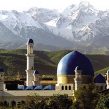
Kazakhstan Imposes Tougher Measures to Stem the Rise of Religious Extremism
Publication: Eurasia Daily Monitor Volume: 8 Issue: 194
By:

On October 6, the regional court of Aktobe in western Kazakhstan announced verdicts on four members of a terrorist gang. The men were accused of killing two policemen and a special task force officer during shootouts between a group of armed local residents and the police last July in the villages of Kenkiyak and Shubarshi in Aktobe region (see EDM, July 22). Kazakhstan’s most sensational legal case involving terrorism to date lasted more than two months. The court sentenced two of the accused to six- and 14-year jail terms and the other two, recognized as ringleaders of the group, were sentenced to life imprisonment. The closed court proceedings took place in the building of the investigation ward, heavily guarded by special task forces and snipers placed on rooftops. The accused, residents of Aktobe, were charged with setting up criminal groups and the illegal possession of firearms (KTK TV, October 6).
To the majority of the public it remained unclear whether the accused were sentenced for a politically motivated terrorist act or religious extremism, as the court definition was not explicitly formulated. It is reminiscent of a similar court case in Aktobe region in February 2010, when two local residents received six- and seven-year prison terms for allegedly plotting a terrorist act in Dagestan, Russia. They were detained on the border with Russia on July 24, 2009 for allegedly intending to join rebel forces fighting Russian troops in the North Caucasus; but later they were suspected of spreading the ideology of Sayid Buryatski. A prominent spiritual leader of rebel fighters, Buryatski had declared a “holy war” against Russian troops.
On September 23, 2009, six members of the alleged terrorist group who planned to blow up oil installations near Kandyagash settlement in Aktobe region were sentenced to 12 and 17 years in prison. Simultaneously, the accusations of belonging to a Wahabi group were linked to them.
Yet, the trouble is not limited to the complications about legal definitions currently used in Kazakhstan, which frequently fail to draw a clear line between political terrorism and religious extremism and in some cases target innocent people. In addition, constantly changing laws and regulations initiated in the upper echelons of power frequently conflict with the norms and standards accepted by international democratic institutions. This is illustrated by a bill regulating the activities of religious associations, which was passed by the Senate (upper chamber) of Kazakhstan’s Parliament on September 29, and signed into law by President Nursultan Nazarbayev on October 13.
The law, engineered by the Agency for Religious Affairs, triggered of a wave of indignation from non-governmental organizations (NGO) in Kazakhstan as well as from international human rights organizations. Janez Lenarcic, the Director of the OSCE Office for Democratic Institutions and Human Rights (ODIHR), has warned that the new Kazakh law will restrict religious freedom (Interfax-Kazakhstan, September 30).
According to the law, to be registered with the Agency for Religious Affairs, local religious communities should have no less than 50 members, and for regional and national levels the minimum number should be 500 and 2,500, respectively. Commenting on the new regulations, which practically deny registration to small religious groups, Kairat Lama Shariff, the head of the Agency for Religious Affairs said Kazakhstan as a secular state must take urgent measures to stem the inflow of religious sects who propagate extremism. But Absattar Derbisali, the Chairman of the Spiritual Board of Muslims of Kazakhstan believes that Article 7 of the law is harshly restrictive. Article 7 forbids believers from praying in government offices, as well as on the premises of educational and health service institutions. Furthermore, according to the new law, prayer at railway stations and airports is restricted for believers – mostly Muslims – to designated prayer rooms. Absattar Derbisali fears such restrictions will complicate the interrelationship and trust between believers and the state (www.islamnews.ru, October 3).
Kazakhstan’s NGOs were unanimous in their protests against the adoption of the much-criticized law. However, they face equally strong resistance from conservative circles who want the law in effect in order to safeguard the regime against the impact of popular revolutions in the Arab world. Many of the diehards in parliament and government share the view of the presidential advisor Yermukhambet Yertysbaiev, an ardent advocate of harsh measures: “I see no violation of the constitution whatsoever in this law, I categorically reject the opinions voiced by certain human rights campaigners” (www.zakon.kz, October 7).
After the terrorist attacks in Aktobe region in July, President Nazarbayev expressed anxiety in his speeches over the threat of religious extremism in Kazakhstan and tasked the Agency for Religious Affairs with drafting a new law on religion. It was carried out with great haste – within the space of one month – and it appears to completely disregard the prevailing mood among religious groups. The mounting tension provoked by the controversial law shows that the means chosen by the authorities hardly justifies the political ends of stability and peace in the society.




